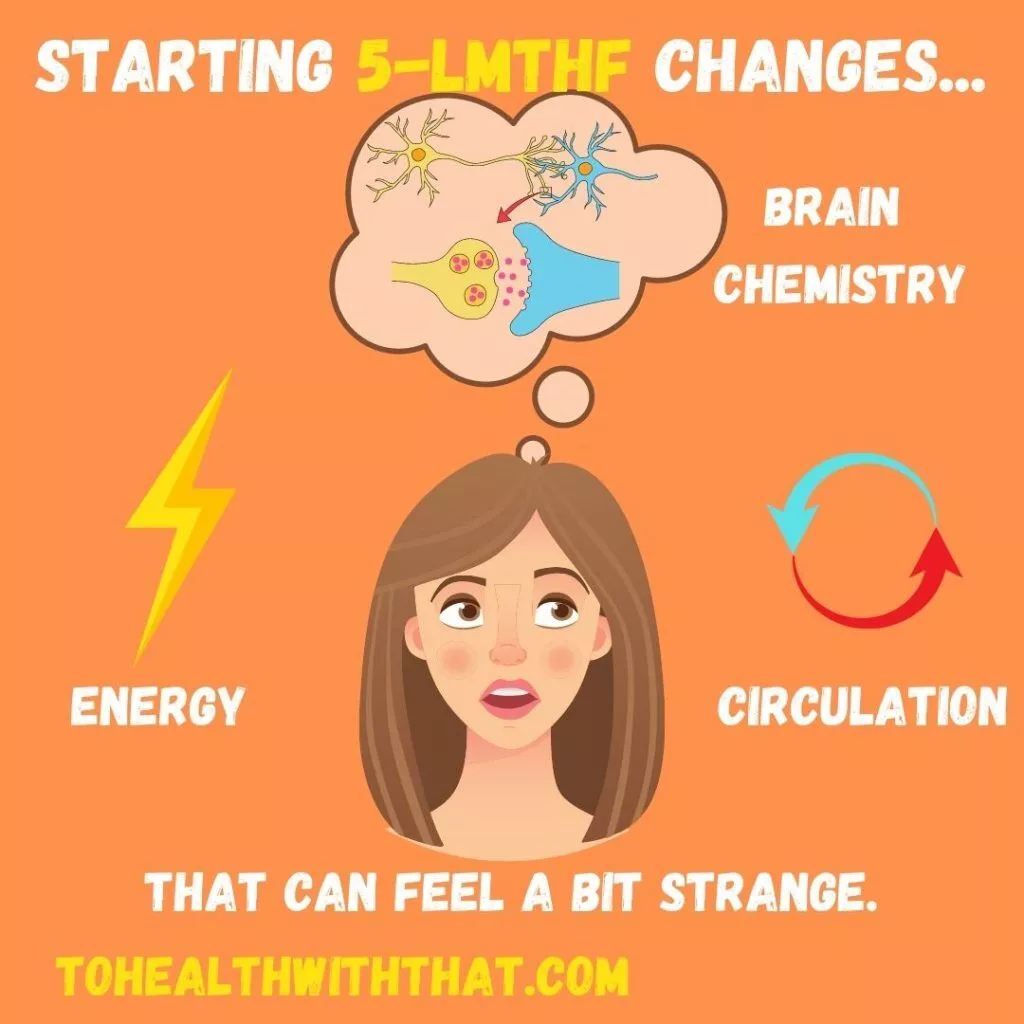Most supplements are a piece of cake. You start them and the worst part is swallowing a pill or choking down some kind of liquid concoction. Not so with methylfolate. It can be easy, but it can be a bit of a nightmare as well. If you’re following along with this process, then next week is the week when we actually *start* methylfolate so this week let’s get all prepared for what you might expect.
Why Methylfolate Causes Symptoms
Vitamins are called vitamins because they have two specific attributes. One is that they are absolutely vital for the normal functioning of the human body. The other is that we can’t manufacture them ourselves. This means all vitamins must come from outside of us, and if they don’t, we start to see systems that don’t work very well, symptoms, and potentially even growth or developmental problems.
With MTHFR, we typically have a functional vitamin deficiency. This means that even if the nutrient is available, we have a harder than average time actually utilizing it. Once you start taking 5-LMTHF, then magically you bypass this entire problem – at least you do if you’re also taking the other B vitamins as we’ve talked about because remember you need cofactors for this to work as well.
So suddenly, your body can do a whole bunch of things that it had a hard time with before and that isn’t always pretty. Here’s why:

- Neurotransmitters – These guys are a high priority for your body, and the methylation pathway feeds directly into the making of them. Changing neurotransmitters, even a little bit, can produce big changes in mood, behavior, personality, and generally how your mind, physical head, pain levels, and digestive processes work. It has the potential to feel strange, uncomfortable, or downright scary.
- Cellular Energy – A lot of what you consider your energy level is actually a reflection of your cellular energy levels and production. Cellular energy can take a big (as in giant) upswing when you start methylfolate or methyl B12, and that can feel pretty scary as well because too much energy feels overcaffeinated, anxious, restless, irritable, and sometimes like flat-out panic. More energy is good for a lot of people, but drinking out of the firehose is always drinking out of the firehose. Too much of a good thing isn’t good anymore.
- Vasodilation – Another of your downstream products with methylfolate is nitric oxide, which is your body’s main vasodilator. Vasodilators open up bloodflow, decrease blood pressure, and are generally a great thing. But, when you start making them in larger quantities it isn’t always a smooth and steady release, sometimes it’s fits and starts which means general fluctuations in circulation and blood pressure. That can mean some pretty strange symptoms like dizziness if you stand up suddenly, weird energy highs and lows, and even changes in vision, ringing in your ears, and all kinds of bizarre symptoms.
The bottom line is that there is a lot of symptom potential in the changes that are happening. They are ultimately good changes, but this is really the reason why we take everything so slowly. Even good changes can feel uncomfortable at first.
Other Reasons Why 5-LMTHF Causes Side Effects
To add to the symptom potential, there are other factors. This chemical pathway is vastly complex and it interconnects with all of the other things your body does on a daily basis. That means, there are literally thousands if not tens of thousands of things that can cause minor hitches.
Minor hitches are nothing to your body – you can handle hundreds of minor hitches at once, but you may notice some of them. Picture rolling a big fat tire down a rocky path on a hill. Will the tire do it? Absolutely. Will it roll over all the bumps, dips, rocks, roots, and branches? Sure it will. Will it be a smooth ride? Nope. There will be zigs, zags, little jumps, and dips. Sometimes the tire will go faster, sometimes slower. It will wobble in some places and you might even think it’s going to fall over, but that tire will make it to the bottom.
Adding 5-LMTHF is a lot like rolling that tire down the hill. The tire is going to move forward, your body is going to use the methylfolate. This whole cycle is going to spin no matter what. But, it’ll be a bit bumpy.

The more we do the prep work, the smoother that trail becomes. This is why starting with a good foundation and doing the preliminaries is so important – it’s like smoothing out that trail on the hill. The whole point of moving so slowly and systematically is that we’re trying to minimize the bumps. We probably can’t take them away completely, but we can make them smaller and easier.
5-LMTHF Makes Your Body Change and That Can Feel Like Symptoms At First
The final reason why starting methylfolate causes symptoms is that it is pushing your body to change in a profound way. The stronger the change, the stronger the response, and frankly, changing almost anything feels weird. That is just the basics of medicine. We need change to get better, but that doesn’t always mean that it’s easy or neat.

The whole reason we’re talking about this is so that you don’t go into this blind. If you know there might be some symptoms then it’s a lot easier to have some faith, when those symptoms pop up, that you’re on the right track and that symptoms don’t mean this is the wrong direction for you. Also, hopefully, so you don’t just start with the first massive dose of methylfolate that you find. That route does work for some people, which is great, but it also backfires for some people so I like to caution people to go low and slow.
Thanks so much for listening today and for caring enough about your health to be here. If you want to meet other people who care about their health too, I’d love it if you’d join us in Genetic Rockstars – it’s a community for people who are making their health better. We’ve got Tuesday tips, monthly themes, polls, questions, and discussions all for you. Also, if you’re enjoying this podcast and have the means to do so, I would so appreciate your support on Patreon. Go to patreon.com/thwt and join for all kinds of perks and to keep this podcast coming.
MTHFR is a common genetic mutation that can contribute to anxiety, depression, fatigue, chronic pain, infertility, and more serious conditions like breast implant illness, heart attack, stroke, chronic fatigue syndrome, and some types of cancer. If you know or suspect you have an MTHFR variant, schedule a free 15-minute meet-and-greet appointment with MTHFR expert Dr. Amy today.
Book Your Appointment
